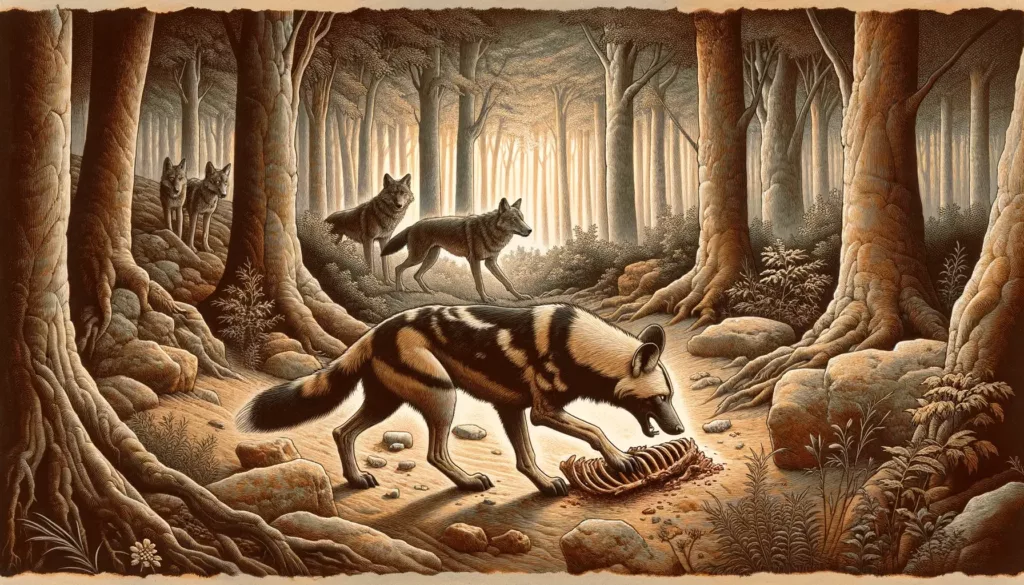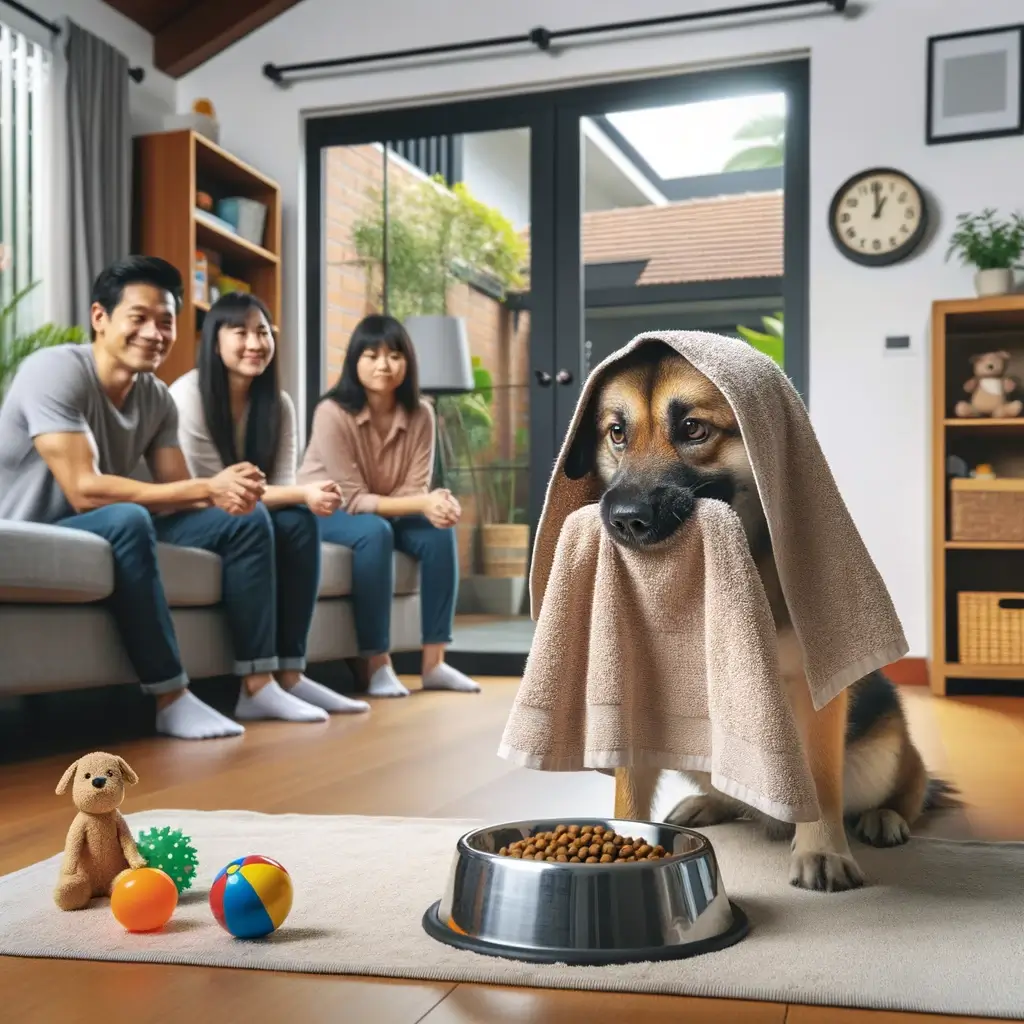Key Takeaways:
- Dogs cover and hide food due to evolutionary instincts, stress/anxiety, resource guarding, attention-seeking, and breed tendencies.
- Excessive or aggressive covering may indicate larger issues to address.
- Manage the behavior by separating dogs at mealtime, supervising, training, and preventing overfeeding.
- Monitor excessive covering but generally enjoy this natural dog behavior.
Many dog owners have experienced their pooch trying to cover up or hide their food, either with towels, blankets, or by burying it around the house. This strange behavior naturally raises questions about why dogs feel the need to conceal their meals.
Reasons Dogs Cover Their Food
The act of covering or hiding food can be traced back to dogs’ ancestral roots. Wolves and wild dogs would bury meat and bones to save them for later consumption. This instinct persists in domesticated dogs today, even though buried kibble doesn’t quite have the same appeal! Besides evolution, there are a few other explanations for this quirky canine food ritual.

Evolutionary Instincts
The instinct to bury and preserve food originated with wild dogs who had to hunt for survival. After making a big kill, they would bury part of the carcass to protect it from scavengers and save it for future meals. This behavior allowed them to store food when fresh meat was scarce.
Burying and covering food was essential for survival in the wild. Today’s pampered pups have constant access to food, but the instinctual urge to hide food persists even though it is unnecessary in a domestic setting. This indicates just how ingrained the food covering habit is even after generations of dogs solely eating prepared commercial dog food.
It’s a habit as old as dogs themselves. While domestic dogs don’t gain any practical benefit from hiding their kibble or dog treats, the instinct remains engraved in their DNA through centuries of selective breeding and passed down from their ancestors.
Some breeds in particular, like terriers, hounds, and herding dogs, are prone to food covering because their breeding history purposefully retained strong hunting and foraging instincts.
So next time your dog tries to stash her dinner away, she is just indulging an ancient inherited quirk!
Stress, Anxiety, or Illness
Dogs who experience separation anxiety, travel anxiety, fear of loud noises, or other stressors may find comfort in covering their food. The act can provide nervous dogs with a sense of safety and relief in uncertain situations. Having the ability to “control” the environment by hiding food resources helps mitigate feelings of stress.
Dogs also bury food when experiencing stomach upsets or nausea from an illness or medication. Conditions like inflammatory bowel disease or intestinal parasites can make dogs nauseated, causing them to cover up uneaten food.
And dogs receiving harsh medications like chemotherapy may lose their appetite and attempt to bury food they previously desired. For these anxious or unwell dogs, the act of covering their uneaten meal provides a sense of security in the face of uncertainty and distress.

Resource Guarding
In multi-dog households, covering food can protect it from other pets. Dogs are hardwired to guard precious resources like food due to limited availability in the wild. When another furry food competitor is around, hiding the grub avoids confrontation while still staking a claim on the chow.
The age-old instinct to preserve food overlaps with the inclination to protect it from perceived competitors. Domestic pups don’t have the same scarcity concerns, but their natural food guarding instincts remain intact.
Stashing chow keeps it “safe” from canine housemates who might mooch it. This explains why solo pups are less likely to cover food compared to dogs in multi-pet homes.
The resource guarding theory is further supported by dogs who only cover coveted, high-value treats or meals and not their everyday kibble. So when your dog hides that steak behind the couch, don’t take offense – he’s just being a dog!
Attention-Seeking
For some dogs, playing with blankets and towels to shroud food is simply an entertaining game. Pups who engage their natural curiosity and problem-solving skills through hiding toys or food often do it for fun, especially intelligent and energetic breeds.
Working dog breeds like Aussies and Collies in particular need ample opportunities to challenge their brains. Hiding and uncovering food repetitively satisfies their craving for stimulating mental enrichment. It also taps into their natural herding ability, allowing them to push and manipulate objects.
So reward your pup’s innovation by designating an old blanket as fair game for food-burying play. Rotate stashing puzzles and food-dispensing toys to redirect the hiding habit productively.
Outward Signs of Food-Related Stress in Dogs
| Symptom | Description |
|---|---|
| Aggression | Guarding buried food, growling when approached |
| Anxiety | Pacing, trembling, distressed vocalizing |
| Excessive salivation | Nausea or food aversion |
| Lethargy | Loss of energy, lack of playfulness |
| Vomiting/diarrhea | Intestinal irritation or inflammation |
| Loss of appetite | Refusing food or uninterested in eating |
| Obsessive behavior | Intense focus on covering food |
Dog Breed
Certain breeds like herding dogs, hounds, and terriers are more prone to food covering than others. Their breed-specific instincts drive them to bury snacks just as they would natural prey.
Terriers in particular were bred to chase down prey and cache it underground until the hunt was over. Hounds and shepherds also have enhanced scavenging and foraging tendencies.
It’s no surprise that these breeds find satisfaction in nose-burying kibble, channeling their ingrained hunting behaviors. Letting your pup indulge her genetic inclinations to cover food is healthy, even if she’s unlikely to ever hunt real rodents or moles!
When to Be Concerned
Most of the time, a dog covering food is no cause for alarm. However, if your pup seems obsessive, stressed, or frantic about hiding food, it could indicate a larger anxiety issue or illness requiring attention. Aggressive guarding of buried food also warrants a vet visit to address potential resource aggression.
Signs your dog’s food covering habits may stem from a medical or behavioral problem include:
- Aggressively guarding buried food from humans or other pets
- Covering food very frequently throughout the day
- Appearing anxious or distressed without the covering behavior
- Vomiting or diarrhea
- Loss of appetite
- Lethargy
If your dog exhibits any of these symptoms along with obsessive food burial, consult your vet to rule out health problems like gastrointestinal disease or cancer which could cause nausea. Medications can also produce side effects making dogs feel unwell.
Next, seek advice from an animal behaviorist to curb problematic burying behavior through behavioral training. They can design a customized training plan using conditioning and positive reinforcement to dissuade anxiety-related covering. In some cases, anxiety medication may be recommended in conjunction with behavior modification. Getting to the root of the stressor is key to permanently stopping obsessive food hiding.
Managing Your Dog’s Food Covering Habits
For most dogs, covering food is just an occasional quirk, not a detrimental behavior. Here are some tips to discourage the messy habit without confusing your pup:
- Feed dogs separately to avoid competition and resource guarding between pets. Each dog can relax and eat in peace without worrying about defending their meal. Separate bowls in different rooms is ideal.
- Supervise mealtime to catch any obsessive food covering right away. Monitor your dog’s demeanor and actions during and after eating. Make notes about hiding frequency and intensity. Also observe their appetite at each meal.
- Train your dog using positive reinforcement. If they try burying food, interrupt the behavior with a firm “no” and redirect their attention to a simple cue like “sit.” Reward with praise and treats when they comply. Stay patient and consistent.
- Prevent overfeeding by sticking to proper portion sizes appropriate for your dog’s needs. An overflowing food bowl can trigger the instinct to stash away extra. Follow recommended feeding guidelines based on your dog’s weight and activity level.
- Add food-dispensing toys like snuffle mats, puzzle bowls, and Kongs to satisfy scavenging instincts. These provide mental enrichment while slowing down eating.
- Keep mealtimes low-stress with a consistent schedule, quiet location away from other pets, and limited disturbances. Soothing music or pheromone diffusers can also help anxious pups relax.
The Bottom Line
Dogs cover and hide their food for a variety of instinctual and behavioral reasons. While occasional covering is perfectly normal, excessive or stressed behavior could indicate issues to address with your vet. Rule out medical problems, then use tactics like separate mealtimes, supervision, training, and proper portions to curb food burying. But keep in mind that this behavior is deeply ingrained in dogs’ ancestry – it’s not usually something to deter. Let your pup indulge her instinct to cover food within reason and enjoy this endearingly canine quirk!
Hi, I’m John and I love dogs. Ever since I was a kid, I always wanted to have a furry friend by my side. I grew up with a golden retriever named Max, who taught me a lot about loyalty, friendship, and fun. He was my best buddy for 12 years, and I miss him every day.
